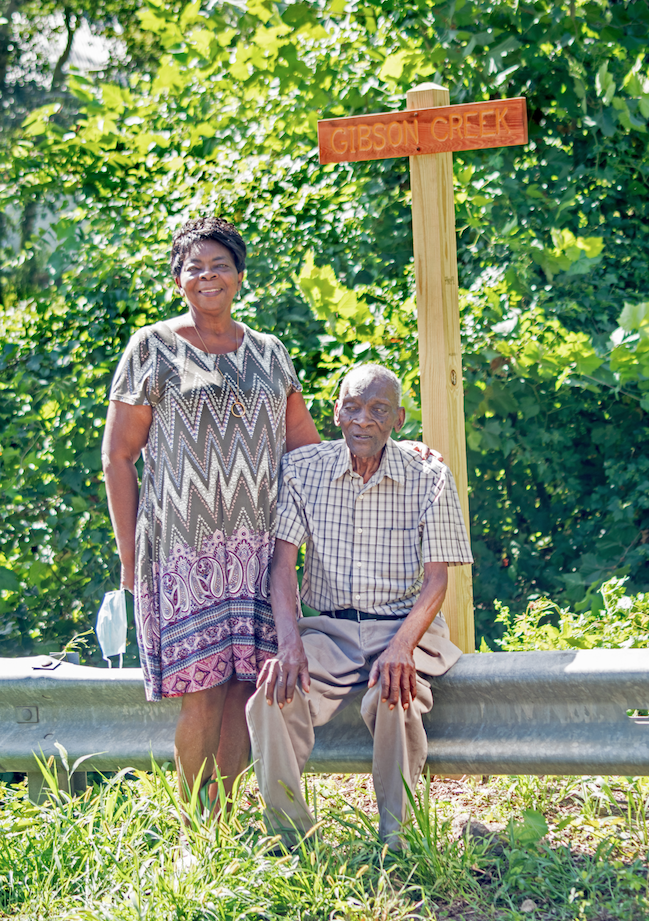Since retiring from the American Red Cross in 1984, George Gibson, 92, has been a regular fixture inside the South Asheville Cemetery. Residents of the surrounding neighborhood would often see him trimming weeds, raking leaves, removing fallen tree limbs and cleaning off gravestones. His dedication has inspired others to join in the cause, though regular group workdays have been on hold since the beginning of the coronavirus pandemic in March.
Established in the early 1800s, the South Asheville Cemetery began as a burial ground for enslaved people. Adjacent to the St. John “A” Baptist Church, the cemetery continued operations until 1943. The majority of the 2,000 bodies interred on the site lie in unmarked graves.
In August, members of the South Asheville Cemetery Association and Kenilworth residents recognized Gibson’s contributions with a small ceremony at the corner of Norfolk Street and Wyoming Road, where the group installed a new sign bearing the name Gibson Creek. The waterway, officially designated in 2018 through RiverLink’s Name That Creek program, honors Gibson’s family lineage.
Carolyn Tingle, a member of the Kenilworth Residents Association and the event’s lead organizer, recalls the challenges of hosting the ceremony during COVID-19. “Everybody was wearing masks, and we stayed spread apart,” she says. But a few participants, happy for Gibson and moved by the celebration, broke with guidelines to shake Gibson’s hand.
“I was right behind him with hand sanitizer,” Tingle says with a laugh.
A stone’s throw
At the event, Tingle adds, Gibson shared stories about growing up alongside the creek during segregation. “He lived in the [Black] South Asheville neighborhood, which was a stone’s throw away from [white] Kenilworth,” Tingle explains. “He said that they weren’t all good people [in Kenilworth], but there were so many good that the bad had to join in.”
Segregation also factored into Gibson’s fondness for the South Asheville Cemetery. As a Black youth growing up in the 1930s, he didn’t have the option to go wherever he pleased. “We weren’t allowed to run around all places,” he explains. “So we would mostly go to the [South Asheville] cemetery, read stones and whatnot.”
Though Gibson has no family members buried at the location, he feels a deep connection to the space. “A lot of members of our church are there,” he explains. And as a boy, Gibson continues, he helped transfer bodies to the property.
More to come
The new Gibson Creek sign, designed and fabricated by Warren Wilson College professors Jeffrey Keith and James Darr, is the first of two planned markers. The second, which requires additional funding to complete, will include information about the Gibson family. To learn more about the cemetery and how to get involved, visit www.southashevillecemetery.net.

Olivia Metz, Gibson’s daughter and a member of the SACA, says the initial installation was timed to ensure that her elderly father could take part in a portion of the public recognition of his work. “He has health issues,” she reveals. “But my dad is strong.”
Despite his declining health, Gibson remained a regular participant at the South Asheville Cemetery workday cleanups prior to COVID-19. “I’d try and surprise [volunteers] with refreshments and whatnot,” he says. “I’d mostly go out to show my appreciation for what they’re doing.”
Both he and his daughter express deep gratitude to local organizations — including student groups from UNC Asheville and Warren Wilson College, as well as Hood Huggers International and the Preservation Society of Asheville and Buncombe County — for their dedication to maintaining the property.
Even amid the current health crisis, notes Metz, she still sometimes sees smaller, informal groups working to maintain the site.
Not in vain
And though the pandemic prevented a more formal gathering for the sign’s dedication — and continues to create delays in design proposals for the second marker, as well as fundraising initiatives — Metz says the recent outpouring of support has been overwhelming. As a child growing up in the segregated South, her father never could have imagined being recognized for his community work.
“I’m just so grateful for him,” she continues. “For him to realize that his living has not been in vain.”





Before you comment
The comments section is here to provide a platform for civil dialogue on the issues we face together as a local community. Xpress is committed to offering this platform for all voices, but when the tone of the discussion gets nasty or strays off topic, we believe many people choose not to participate. Xpress editors are determined to moderate comments to ensure a constructive interchange is maintained. All comments judged not to be in keeping with the spirit of civil discourse will be removed and repeat violators will be banned. See here for our terms of service. Thank you for being part of this effort to promote respectful discussion.